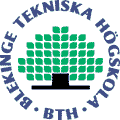

|
|
|
|
|
|
|
|
|
|
|
|
|
|
|
|
|
|
Blekinge Institute of Technology (formerly the University of Karlskrona/Ronneby) was founded in 1989.
In teaching, BTH emphasises problem-based learning. Students work in projects, often in collaboration with businesses and other organisations. Cross-disciplinary course modules and co-operative projects are offered, involving students and staff from different disciplines. Through research projects as well as student projects, through organised meetings and visits, the academic work is put in close contact with industry and society.
The department of software engineering and computer science is the largest department within the university with more than 60 staff members. There are three research groups at the department, working on software engineering (RISE), multi-agent systems (SoC) and use-oriented design and development of Software (UODDS).
The UODDS research group involved in the proposal focuses on the research activities around Design for Design in Use, Software Development as Work, and Cooperative Method Development. To be able to develop relevant guidelines and methods for use orientation, we focus our empirical research on the actual work practice of software development. Software Development as Work describes our empirical research approach, using qualitative social science methods informed by ethnography and ethnomethodology. Cooperative Method Development uses empirical findings as a starting point to adapt and further develop methods together with practitioners. Design for Design in Use we termed the research focus were we relate methods, techniques and tools promoting the design of adaptable software that can be tailored to a developing work and business practice.
Design in Use of Database Applications has been a two-year project in co-operation with, beside other partners, one of the major Swedish telecommunication providers. Mobile communication is a fast growing and shifting market. In such application contexts, the co-development of work practice and software is a promising approach. In the project, we explore techniques and methods for the development of flexible systems. We were able to try out different technical solutions and evaluate them together with our industrial partners regarding different software quality requirements.
In another project in co-operation with Dr. Sara Eriksén from the Department of Human Work Science we focus on the development of supportive technologies for municipalities. We look at (work) practices, software support, and organisation of software development answering the challenge of technological infrastructures for service municipal service provision. Also in this project the adaptation of a computer infrastructure to a developing use context and end user tailoring is an important aspect of the resea

